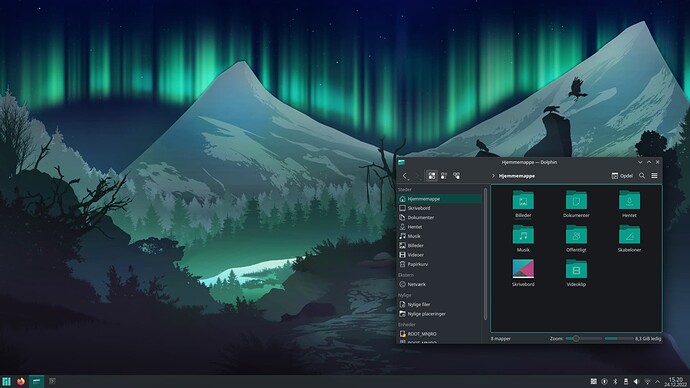Hello ARM community.
As our first major update of 2023, this brings in lots of updated stuff including the new XFCE 4.18.
The Breath theme got a new wallpaper!
Some highlights:
- Most of our kernels got updated
- Handbrake updated to 1.6.0
- Phosh updated to 0.23
- Breath updated to 22.0.0
- Mesa updated to 22.3.2
- KDE Gear applications updated to 22.12.0
- Firefox updated to 108.0.1
- KDE Frameworks updated to 5.101
- Libcamera updated to 0.0.3
- Thunderbird updated to 102.6.1
- XFCE updated to 4.18.0
- Lots of updated packages for our Mobile offerings
- The regular Python updates
- And regular updates from upstream
Gnome 43 theme changes
Gnome 43 changes how themes are applied to the system, so when upgrading you might notice something is off with the theming.
We have tried to make it easy to get a pretty good theme going when updating, but it does require a few steps.
- Install
adw-gtk3andgradience. But you will need to set your own colors in Gradience after it’s installed. - Open Gradience and import this preset (link will follow) and Apply it.
How to get Waydroid working
If you follow these steps, you should have Waydroid working fine.
Remember, Waydroid only works on wayland!
- Install
waydroid-imageand all it’s dependencies. - Run
pkexec setup-waydroid. - You should now be able to launch Waydroid. The first launch takes a while.
How to use Kodi RPI on Manjaro ARM
If anyone wants to test kodi on the rpi, install these packages:
sudo pacman -S kodi-rpi kodi-rpi-dev kodi-rpi-eventclients kodi-rpi-tools-texturepacker libcec-rpi linux-rpi4 xf86-video-fbdev
Have it set up is to boot straight in to kodi
This means the kodi.service file need to replace whatever login manager you have installed. In my case I would:
sudo systemctl disable lightdm.service
sudo systemctl enable kodi.service
They recommend removing custom configs in config.txt. We ran into an issue if a value was set with gpu_mem=.
My config.txt with a bit of overclocking:
over_voltage=5
arm_freq=2000
#gpu_mem=64 #disable this
initramfs initramfs-linux.img followkernel
kernel=kernel8.img
arm_64bit=1
disable_overscan=1
#enable sound
dtparam=audio=on
hdmi_drive=2
#enable vc4
dtoverlay=vc4-kms-v3d,cma-512
#max_framebuffers=2 #disable cause kodi uses more
disable_fw_kms_setup=1
Some notes:
The default user will be kodi
kodi home directory will be /var/lib/kodi
So put test video in /var/lib/kodi/Videos so you can get to it
after setting up the video directory in kodi.
Upstream Notifications:
Removing python2 from the repositories
https://archlinux.org/news/removing-python2-from-the-repositories/
Older notifications
If you used the Manjaro ARM Installer or is using PinePhone or PineTab, you need to redo your passwords, because of an update to libxcrypt:
Arch Linux - News: Sorting out old password hashes
Chromium will loose sync support in early March:
Arch Linux - News: Chromium losing Sync support in early March
ghostpcl>=9.53.2-2 and ghostxps>=9.53.2-2 updates require manual intervention:
Arch Linux - News: ghostpcl>=9.53.2-2 and ghostxps>=9.53.2-2 updates require manual intervention
The nss and zn_poly packages requires manual intervention:
Arch Linux - News: nss>=3.51.1-1 and lib32-nss>=3.51.1-1 updates require manual intervention
Arch Linux - News: zn_poly 0.9.2-2 update requires manual intervention
The packages hplip and firewalld requires manual intervention:
Arch Linux - News: hplip 3.20.3-2 update requires manual intervention
Arch Linux - News: firewalld>=0.8.1-2 update requires manual intervention
Package changes:
(Tue Jan 3 20:18:24 CET 2023)
- arm-stable community aarch64: 767 new and 768 removed package(s)
- arm-stable core aarch64: 91 new and 90 removed package(s)
- arm-stable extra aarch64: 865 new and 867 removed package(s)
- arm-stable kde-unstable aarch64: 404 new and 405 removed package(s)
See the full package list here
Testers needed on arm-testing branch
We are in need of testers for our arm-testing and arm-unstable branches.
So if you are adventurous and want newer software quicker, we would love for you to help us test out the new packages in arm-testing branch.
All you have to do to switch to this branch is:
- Run this command to switch branch:
sudo pacman-mirrors -aS testing && sudo pacman -Syyu. This will generate a new mirrorlist for you, sync your databases with the new mirror and update your system using the arm-testing branch.
We would then love for you to give feedback in our update posts in #manjaro-arm:arm-testing-updates. That way we can better find and fix bugs, before they hit arm-stable branch. Thank you!
Donation
Please consider supporting Manjaro ARM directly via Patreon, Ko-Fi or Open Collective.
You can also donate to our upstream, which is Arch Linux ARM.
Poll
- No issue, everything went smoothly
- Yes there was an issue. I was able to resolve it myself. (Please post your solution)
- Yes i am currently experiencing an issue due to the update. (Please post about it)
0 voters
Check if your mirror has already synced:
